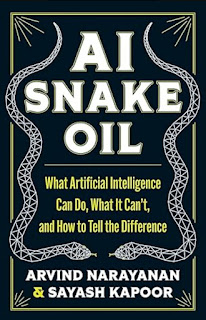Book reviews: Artificial intelligence research
Because my university has begun incorporating AI into research and our Microsoft Office suite now includes Copilot AI, I decided to read up on the various technologies described by the term and this post is a book list of the six most helpful books I read.
Other titles not included here struck me as either intended to drum up fear or enthusiasm about the technology, and one book that read like it had actually been written by ChatGPT. This is not a comprehensive or exhaustive list of all the titles on the subject, if you have another book about AI to recommend, please leave a comment.
Brave New Words by Salman Khan
This author is the founder of the digital learning platform, Khan Academy, and this book explores the way in which AI tutors have the potential to transform education delivery in nations with low rates of primary education for all but the children from the wealthiest families.
My takeaway on this book is that AI driven learning modules for children in rural areas of countries around the globe who might not otherwise get individual attention in learning basic skills of math, science, language will be well-served by this technology.
AI Snake Oil : what artificial intelligence can do, what it can’t, and how to tell the difference by Arvind Narayanan and Sayash Kapoor
These two authors are well known developers and academics in the field of machine learning. This book is fantastic for explaining the different kinds of technology referred to as “AI,” how it works and was created, what it can do and what it can’t. Not dry or super technical. Highly recommend.
Weapons of Math Destruction: how big data increases inequality and threatens democracy by Cathy O’Neil:
This title was recommended by the AI book club being run by my university’s AI development cohort.
This author is a mathematician and statistical data analyst. She writes about how algorithms manipulate everything from social media feeds to what links show up on a Google search. Sociologically fascinating, informative, and a bit scary. The algorithms she’s talking about and data sets are somewhat different from the programming and data sets involved in generative AI, so if you are looking for more information about how something like ChatGPT works, for example, this is not necessarily the book for you, but it is still probably worth a read
Unmasking AI by Joy Buolamwini
This Nigerian author got a PhD in machine learning from MIT, a degree she was working toward when she realized that the facial recognition software she was studying struggled to register & recognize darker skintone faces. She began to investigate how societal inequities are incorporated into the nature of AI technologies and the datasets they work with.
I didn’t expect this to read like a memoir but it does, which brings a very human perspective to the topic. I appreciate how the author interweaves her own history and story with the illuminating information about facial recognition and image processing AI technologies.
This title was also recommended by the AI book club being run by my university’s AI development cohort.
A global perspective on the machine learning technologies now collectively referred to as AI. The author addresses inherent biases and the exploitative labor practices inseparable from machine learning of the generative sort. This could have been dry, but I found it quite readable.
Code Dependent by Madhumita Murgia
This author is an investigative journalist who has been working on reporting stories about the tech sector for years, so she brings a digital literacy to this book, but admits at the beginning that she had no idea what AI actually meant when she began writing it, and the book traces her path of understanding. A global perspective on AI that casts the various tools and platforms in individual human terms.
In all of these cases, I listened to the audiobooks and can recommend that format.









Comments
Post a Comment